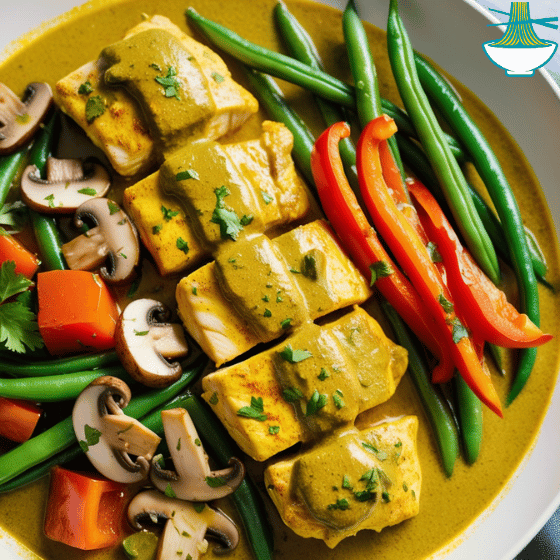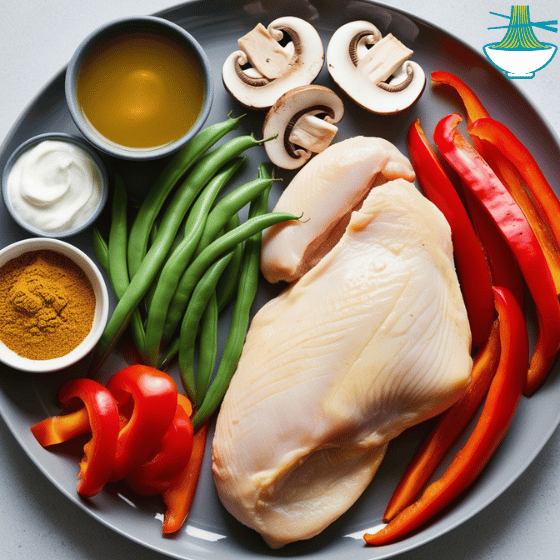This Curried Chicken recipe is a great choice for bodybuilders, fitness enthusiasts, and active individuals in need of a nutrient-packed meal. With 32g of protein per serving, it aids muscle growth and recovery while providing a balanced mix of carbohydrates and healthy fats for sustained energy. Packed with essential vitamins and minerals, including vitamin B6 (supports metabolism), vitamin C (boosts immune function), potassium (promotes heart health), and magnesium (aids muscle recovery), this dish supports overall health and performance. Easily customizable with alternatives like tofu or low-sodium broth, it's a delicious and adaptable option for anyone seeking a quick, nutritious, and flavorful meal.

Ingredients:
- 5 oz boneless, skinless chicken breast
Alternative: Skinless turkey breast or tofu (for a plant-based version)
- 1/4 cup canned chicken broth (condensed)
Alternative: Low-sodium vegetable broth or homemade vegetable broth
- 4 tsp cornstarch
Alternative: Arrowroot powder or tapioca starch (natural, gluten-free thickening agents)
- 5 cups fresh mushrooms, sliced
Alternative: Shiitake mushrooms, portobello mushrooms, or any variety of fresh mushrooms
- 4 tsp extra virgin olive oil
Alternative: Avocado oil or coconut oil (both are healthy oils with different flavor profiles)
- 2 cups red bell pepper, diced
Alternative: Yellow or orange bell peppers for a different color and mild sweetness
- 2 cups green snap beans (or snow peas), trimmed and cut into pieces
Alternative: Broccoli florets or zucchini for a different texture and flavor
- 1 cup low-fat yogurt (unsweetened)
Alternative: Greek yogurt (unsweetened) for more protein or dairy-free coconut or almond yogurt for a plant-based option
- 2 tsp curry powder
Alternative: Homemade curry powder mix with turmeric, cumin, coriander, and ginger for a customizable and fresh flavor mix
- Optional: 1/4 cup white wine (for added flavor)
Alternative: Apple cider vinegar or lemon juice for a tangy, non-alcoholic substitute

Preparation Method:
1. Prep the Chicken:
- Cut the 5 oz of boneless, skinless chicken breast into bite-sized cubes. This ensures even cooking and better flavor absorption.
2. Prepare the Vegetables:
- Slice the 5 cups of fresh mushrooms thinly.
- Dice the 2 cups of red bell pepper into small chunks.
- Trim and cut the 2 cups of green snap beans or snow peas into smaller pieces if needed.
3. Make the Sauce:
- In a small bowl, whisk together the 1/4 cup canned chicken broth, 4 tsp of cornstarch, and 2 tsp of curry powder until the cornstarch is dissolved and the mixture is smooth.
4. Cook the Chicken:
- Heat 2/3 tsp of olive oil in a non-stick sauté pan over medium heat. Once hot, add the diced chicken and cook, stirring occasionally, until browned and fully cooked through (about 5-7 minutes). Remove the chicken from the pan and set aside.
5. Prepare the Sauce:
- In the same pan, add the optional white wine (if using), chicken broth mixture, yogurt, and curry powder. Stir constantly as the sauce thickens (about 5 minutes). Once thickened, reduce the heat to low and simmer for 5 minutes.
6. Sauté the Vegetables:
- While the chicken is cooking, heat the remaining 4 tsp of olive oil in another sauté pan over medium heat. Add the sliced mushrooms, diced red bell pepper, and snap beans. Stir occasionally and cook until the vegetables are tender, about 5-7 minutes.
7. Assemble the Dish:
- Plate the cooked vegetables evenly between two plates. Top with the curried chicken mixture, ensuring that each plate receives an equal amount of the chicken and sauce.
8. Serve:
- Garnish with fresh herbs such as cilantro or parsley if desired, and serve immediately. Enjoy your healthy and flavorful curried chicken!
Frequently Asked Questions (FAQ)
1. Can I substitute the chicken with a vegetarian protein source?
Yes, you can! Tofu or tempeh are excellent vegetarian protein alternatives. Simply marinate them in the curry sauce for a few hours before cooking.
2. Can I make this recipe low-carb?
Absolutely! To reduce carbs, use cauliflower rice instead of regular rice. You can also omit the red bell pepper and snap beans or replace them with low-carb vegetables like zucchini or broccoli.
3. How can I make this recipe spicier?
To increase the spice level, add more curry powder, red pepper flakes, or a pinch of cayenne pepper to the sauce. You can also use a hotter variety of chili pepper.
4. Can I make this recipe ahead of time?
Yes, you can make this recipe ahead of time. Cook the chicken and vegetables, then store them separately in airtight containers in the refrigerator. When you're ready to eat, reheat the ingredients and combine them with the sauce.
5. What can I serve with this curried chicken?
This curried chicken pairs well with a variety of sides. Here are a few suggestions:
- Brown rice or cauliflower rice
- Naan or roti
- A side salad
- A dollop of plain Greek yogurt
Nutrition Value:
- Calories: 373
- Protein: 32g
- Carbohydrates: 35g
- Fat: 13g
- Carb - Protein - Fat % Ratio: 37% - 33% - 30%
This nutrient profile offers a balanced mix of macronutrients, supporting muscle growth, energy production, and overall body function. The moderate fat content helps maintain healthy body functions, while the protein supports muscle repair and growth, and the carbohydrates provide energy for physical activity.
The nutritional information for each ingredient.
1. 5 oz boneless, skinless chicken breast, cut into bite-sized cubes
- Calories: 165
- Carbohydrates: 0g
- Protein: 31g
- Fat: 3.6g
- Sodium: 75mg
- Cholesterol: 75mg
- Vitamins: Vitamin B6 (helps with metabolism)
- Minerals: Phosphorus, selenium (supports bone health and immune function)
- Nutritional Benefit: Chicken breast is a lean protein that supports muscle growth, repair, and overall bodily functions while being low in fat. It’s also rich in essential vitamins and minerals like vitamin B6 and selenium, which help with energy production and immune system function.
2. 1/4 cup canned chicken broth (condensed)
- Calories: 15
- Carbohydrates: 1g
- Protein: 1g
- Fat: 0g
- Sodium: 400mg (can vary with brand)
- Cholesterol: 5mg
- Vitamins: Small amounts of B vitamins
- Minerals: Potassium, magnesium (supports heart and muscle function)
- Nutritional Benefit: Chicken broth provides a savory flavor and is a source of minerals like potassium and magnesium. However, the sodium content can be high, so using low-sodium options can be a healthier choice to reduce salt intake.
3. 4 tsp cornstarch
- Calories: 30
- Carbohydrates: 7g
- Protein: 0g
- Fat: 0g
- Sodium: 0mg
- Cholesterol: 0mg
- Vitamins: None
- Minerals: None
- Nutritional Benefit: Cornstarch is primarily a carbohydrate that helps thicken sauces without adding fat or calories. It serves as a neutral thickening agent that provides a smooth texture to sauces.
4. 5 cups fresh mushrooms, sliced
- Calories: 40
- Carbohydrates: 8g
- Protein: 4g
- Fat: 0g
- Sodium: 10mg
- Cholesterol: 0mg
- Vitamins: Vitamin D (important for bone health), Vitamin B5 (supports energy production)
- Minerals: Selenium, potassium, copper (supports antioxidant function and heart health)
- Nutritional Benefit: Mushrooms are low in calories and fat but rich in antioxidants and vitamins. They support immune function and bone health, particularly with vitamin D, and provide fiber for digestive health.
5. 4 tsp extra virgin olive oil (divided)
- Calories: 160
- Carbohydrates: 0g
- Protein: 0g
- Fat: 14g
- Sodium: 0mg
- Cholesterol: 0mg
- Vitamins: Vitamin E (antioxidant that protects cells)
- Minerals: Small amounts of calcium, iron, and potassium
- Nutritional Benefit: Olive oil is a healthy fat, rich in monounsaturated fats, which have anti-inflammatory effects. It supports heart health, improves cholesterol levels, and provides antioxidants like vitamin E, which helps protect cells from damage.
6. 2 cups red bell pepper, diced
- Calories: 50
- Carbohydrates: 12g
- Protein: 2g
- Fat: 0g
- Sodium: 0mg
- Cholesterol: 0mg
- Vitamins: High in Vitamin C (supports immune system and skin health), Vitamin A (important for vision and skin health)
- Minerals: Potassium, folate (important for cell growth and function)
- Nutritional Benefit: Red bell peppers are packed with vitamin C, which helps boost the immune system and protects against oxidative stress. They also provide fiber and antioxidants, promoting healthy digestion and skin.
7. 2 cups green snap beans (or snow peas), trimmed and cut into pieces
- Calories: 70
- Carbohydrates: 16g
- Protein: 4g
- Fat: 0g
- Sodium: 0mg
- Cholesterol: 0mg
- Vitamins: Vitamin C (supports immune function), Vitamin K (supports bone health)
- Minerals: Folate, potassium, iron (supports red blood cell production and heart health)
- Nutritional Benefit: Green snap beans are rich in fiber, helping with digestion and heart health. They also contain vitamin K, important for bone health, and a variety of minerals that contribute to overall well-being.
8. 1 cup low-fat yogurt (unsweetened)
- Calories: 150
- Carbohydrates: 18g
- Protein: 12g
- Fat: 3g
- Sodium: 100mg
- Cholesterol: 10mg
- Vitamins: Vitamin B12 (important for nerve and red blood cell health), calcium (supports bone health)
- Minerals: Phosphorus, potassium (supports bone health and muscle function)
- Nutritional Benefit: Low-fat yogurt is a good source of protein and probiotics, which support gut health. It is also rich in calcium, which is essential for strong bones, and provides essential vitamins like vitamin B12 for nerve function.
9. 2 tsp curry powder
- Calories: 10
- Carbohydrates: 2g
- Protein: 0g
- Fat: 0g
- Sodium: 0mg
- Cholesterol: 0mg
- Vitamins: Vitamin A, Vitamin C (both support immune function)
- Minerals: Iron (supports red blood cell production)
- Nutritional Benefit: Curry powder is a blend of spices with antioxidant and anti-inflammatory properties. Turmeric, one of the main ingredients in curry powder, contains curcumin, which is known for its potential to reduce inflammation and support brain health.
10. Optional: 1/4 cup white wine (for added flavor)
- Calories: 50
- Carbohydrates: 1g
- Protein: 0g
- Fat: 0g
- Sodium: 0mg
- Cholesterol: 0mg
- Vitamins: Small amounts of B vitamins
- Minerals: Small amounts of potassium and magnesium
- Nutritional Benefit: White wine adds flavor complexity but has minimal nutritional value. It is a source of antioxidants, such as resveratrol, but should be consumed in moderation.


Comments